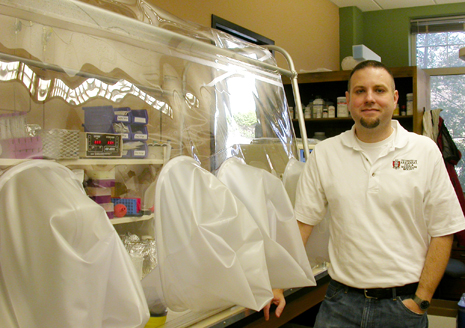
FAYETTEVILLE, Ark. – A University of Arkansas researcher and his colleagues have created the first methane-producing microorganism that can metabolize complex carbon structures, which could lead to microbial recycling of waste products and their transformation into natural gas.
Daniel J. Lessner, assistant professor of biological sciences, and his colleagues Lexhan Lhu, Christopher S. Wahal and James G. Ferry of Pennsylvania State University, published their findings in mBio. Lessner conducted the research as a postdoctoral associate at Penn State.
While methane gas is considered to be a greenhouse gas, it also is an important biofuel, used to power businesses and homes. Finding ways to produce methane gas efficiently therefore interests individuals and industries alike.
Lessner and his colleagues worked with methanogens, methane-producing anaerobic microorganisms from the domain archaea that are thought to date back further in time than any other life form.
“Methanogens are the only organisms that produce methane biologically, but they are limited in what they can use to produce methane,” said Lessner. In nature, a consortium of anaerobic microorganisms break down carbon-rich items, such as leaves in a pond, into simple molecules consisting of one or two carbon atoms, which methanogens then consume, producing methane in the process. Because this process involves multiple species, it can be easily disrupted, and would not be an efficient way to mass-produce methane gas.
Lessner and his colleagues decided to introduce a gene into a methanogen that would allow it to break down more complex molecules for its own consumption. To do this, they introduced a gene into the DNA of the methanogen Methanosarcina acetivorans that expresses an enzyme that breaks down esters, which are found in nature and also solvents used in paints and paint thinners. After introducing the enzyme into the methanogen, the researchers demonstrated that M. acetivorans grew, consumed almost all of the esters, and produced methane from them.
“This establishes a platform to begin engineering these organisms to consume different substrates,” Lessner said. This engineered pathway expands the narrow range of substrates used by methanogens, which may lead to more efficient conversion of biomass to methane gas. While esters might not work at an industrial scale, it might be possible to engineer a methanogen that can break down glycerol, a waste product from biodiesel fuel, and have it produce methane.
Contacts
Daniel J. Lessner, assistant professor, biologicial sciences
J. William Fulbright College of Arts and Sciences
479-575-2239,
Melissa Blouin, director of science and research communication
University Relations
479-575-3033,